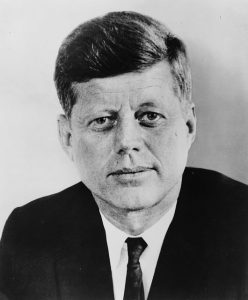私の憧れ NYコロンビア大学で学ぶ!夢を追って大金をかけた英語学習の日々!
 コロンビア大学
コロンビア大学
私の憧れ NYコロンビア大学で学ぶ!
NO5 夢を追って、大金をかけた英語学習の日々!
最後に、このNTコロンビア大学での受講の熱い思いを
少し振り返りたいと思います。
私は日本の田舎育ちで世間知らず、またかなり天邪鬼だったと思います。
そして、入社したローカルメディアで報道部に所属した事で、
大手メディアのジャーナリズムの姿勢、あるべき姿の一端を垣間見ました。
その経験で、単純ですが将来は世界に貢献、活躍する事を夢みていました。
その為には、NYコロンビア大学に入学し、世界のジャーナリストと共に学び
交流する事に大事だとの思いに溢れていました。
私はいつもこの大学に憧れ、国内で仕事をしながら何年も英語の勉強を
続けていました。
通常の報道業務との両立は難しいし、英語教室や個人レッスンに
数百万円もかけて!汗
 ケネディ大統領
ケネディ大統領
思い出すのは、カーステレオで流行歌ではなく、アメリカ、
J・Fケネディ大統領の就任演説をCDで聞いていた事です。
変人ですね!(笑)
一節は今でも覚えています。
「I’m not satisfied with this situation that
many Races were struggling with this society ~」
そして、個人の能力の客観的な評価をしりたくて、1989年、
社会人になってから英検2級の資格をとり、英検1級合格を目指して
勉強を続けていました。
しかし、残念!!
仕事が多忙になり、受験するチャンスを失いました。汗
英語を学ぶ際に、時々言われますが、英会話の時は頭を英語脳に
切り替えろと。
確かに、そうすると頭がすべて英語の発想になり 日本語に訳さない
様になるのですが~。
ひとつ困った事が起こります。
仕事が報道なので 複雑な事案や専門用語などを理解しないと
いけませんでした。
すると、英語脳だと日本語を上手く変換できない事が起こりました。
信じられない程、簡単な単語を忘れてしまう事や関連用語を思いつかない等の
状況がうまれました。汗
現実的に私の仕事は報道なので、原稿を書く事を疎かにはできませんでした。
心の葛藤が続きました。
友人関係も疎遠になり、付き合いが悪くなりました。汗
私は、一つの事しかできない不器用な人間だと改めて悟りました。
非常に残念ですが、職務上やはりベースは、日本語・日本語脳でした。
しかし、同時に、この時はいつも社会人の留学制度でのアメリカ留学を
真剣に考えていました。
なんとかアメリカに留学しようと必死でした。

5年ほどいろいろな試験に挑戦しました。
しかし、現実は厳しくなかなか留学試験に受かりませんでした。
年齢も30歳を過ぎ、仕事も忙しくなって、「夢ばかり追っても無理かな~
諦めよう!」と何度も思いました。
会社には、こうした気持ちがあるのは伝えていました。
陰ながら応援してくれた人もいました。
まあ、冷静に考えれば、非現実的な話なので~!
しかし、1990年、秋に突然 会社から、キー局の海外研修で
アメリカか、ヨーロッパに行く気はあるかと聞かれました。
私はかなり驚きましたが、「当然行きます」「アメリカ・ニューヨーク」を
お願いします」と答えました。
本当に青天の霹靂(へきれき)でした。
まさか、本当にアメリカ・ニューヨークに行って研修を受けることが
できるとは?
私の海外留学・研修の思いは、一つに国内ニュースは東京中心なので
ローカルから情報発信したい事。
また将来的には外国人留学生、研修生も増えてある意味、日常生活に
必要なコミュニケーションツール(公用語)になると思い、ローカル情報も
バイリンガルで発信したいとの想いが強かったです。
当時も、ボーダーレス、グローバル化が世間の注目を集めていた時代。
国内では 農産物の輸入自由化をめぐり、様々論議が行われていました。
私は 勝手ながらそうした論議にローカルのリアルな声が
届いていない感じが強くしていたので、
将来はローカルの話題はローカルから発信できる
スタイルにしたいとの思いがありました。
現在は、ネット社会で地方の情報が飛び交う時代になったと思います。
わずか30年でここまで発展するとは思っていませんでした。汗
現在では、コロナ感染も収まりローカルにも外国人が溢れる時代に
なり、私の街でも欧米人、アジア人が行きかっています。
時々、日本人グループと思っていたらベトナムや韓国人グループの
時もあります。
時々、英語で道や観光地を聞かれるケースも増えました。
本当に時代が変わりました。
また、最後に気になるのはコロンビア大学の「英語力テスト」で出会った
中国人女性がその後どうなったのか?
当時、約30年前アメリカの各大学で学んだ若い中国人がその後、
どんな人生を歩んだのか是非知りたいとも思います。
当時の留学生らが、現在の中国の政治体制や経済体制についてどう判断し、
課題をどう解決するのか?
混迷が続く、国際情勢の中でどう対応するのか?教えて欲しいと思います。
次回に続く!
 Columbia U.
Columbia U.
My aspiration: Studying at NY Columbia Univ!
No. 5 Pursuing Dreams:
Days of Investing a Fortune in English Learning!
Finally, I’d like to take a moment to reflect on
my fervent feelings about
studying at NT Columbia Univ.
I believe I grew up naive in the countryside of Japan and
was quite obstinate.
Joining the reporting department of a local media outlet
exposed me to the attitude of major media journalism and
glimpses of what it should be.
Through that experience, albeit simple,
I dreamed of contributing to and thriving in the world in the future.
To achieve that,
I was filled with a strong desire to enroll at NY Columbia Univ and
engage in learning and exchange with journalists from
around the world.
I always admired this university and continued studying English for
many years while working domestically.
Balancing regular reporting duties with
English learning was difficult,
and I spent millions of yen on English classes and private lessons!
 Pre. Kennedy
Pre. Kennedy
It is worth noting that instead of listening to popular songs on
the car stereo,
I listened to the CD of the inauguration speech of
American President J.F. Kennedy.
Quite eccentric, right? (Laughs)
I still remember a passage from it:
“I’m not satisfied with this situation that
many Races were struggling with this society.”
In 1989, I wanted an objective evaluation of my individual abilities,
so I obtained a Level 2 qualification in the Eiken
(English Proficiency) test and aimed for Level 1
while continuing my studies.
Unfortunately, with my job becoming increasingly busy,
I missed the opportunity to take the exam.
Sweat dripping。
They say when learning English,
sometimes you should switch your brain to English mode
during conversations.
Indeed, doing so makes my mind think entirely in English,
without translating into Japanese.
However, it also creates a problem.
As my job involves reporting,
I needed to understand complex issues and specialized terminology.
This led to difficulties in smoothly translating Japanese with
an English-oriented brain.
I found myself forgetting incredibly simple words or
unable to recall related terms, among other situations.
Sweat poured.
As the reality of my job being reporting meant,
I couldn’t neglect writing manuscripts.
I struggled internally, and my friendships grew distant,
becoming strained. Sweat poured.
Once more as I realized
I was someone who could only do one thing clumsily.
It’s incredibly regrettable, but professionally,
my foundation remained in Japanese and the Japanese way of thinking.
However, simultaneously, during this time,
I seriously considered studying abroad in America through
the adult education exchange program.
I desperately tried various exams for about five years.
However, the reality was harsh,
and I couldn’t pass the study abroad exams easily.
Crossing the age of 30 and with work becoming busier,
I often thought, “Maybe it’s impossible to chase dreams forever—
let’s give up!”

Sometimes, I conveyed my dream feelings to my company.
Some people silently supported me.
Well, thinking calmly, it was an unrealistic story!
However, in the autumn of 1990,
the company suddenly asked me if I had any intention of going to
America or Europe for overseas training at a major station.
I was quite surprised, but I replied, “Of course,
I’ll go. Please send me to America, New York.”
It was truly a bolt from the blue.
Could I really go to America, New York, for training?
My thoughts on studying and training abroad were twofold:
Firstly, domestic news is centered around Tokyo,
so I wanted to disseminate information from a local perspective.
Secondly, I believed that in the future,
with an increase in foreign students and trainees,
being bilingual would become a necessary communication tool
(official language) in daily life.
Therefore,
I strongly felt the desire to disseminate local information bilingually.
At that time, the world was captivated by the idea of a borderless,
globalized era.
There were various discussions surrounding the liberalization of
agricultural imports domestically.
Feeling that the local voices were not reaching these discussions,
I strongly felt the need to make local topics heard locally.
Currently, in the age of the internet,
information from rural areas is exchanged freely.
I never thought it would develop to this extent in just 30 years.
Sweat dripped again.
As the era shifted to one,
where even rural area is filled with foreigners due to
the subsiding of the COVID infection,
with Westerners and Asians flocking to my town.
Sometimes,
groups I initially thought were Japanese turned out to be
Vietnamese or Korean.
Cases where people asked for directions or information about
tourist spots in English also increased.
The times have profoundly changed.
Lastly, I’m curious about what happened to the Chinese woman
I met during the English proficiency test at Columbia Univ.
I wonder what kind of life young Chinese people who
studied at Americanuniversities about 30 years ago have led since then.
I would like to know how those foreign students judged the political and
economic systems of China at the time and
how they resolved issues.
I hope they can teach us how to navigate through
the ongoing confusion in international relations.
To be continued!

